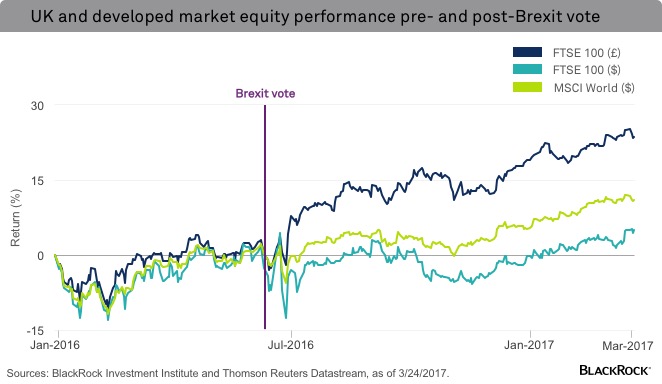by Isabelle Mateos y Lago, Chief Multi-Asset Strategist, BlackRock
The UK is set to formally begin the Brexit process this week. Isabelle explains what this could mean for the UK economy and markets.
The UK’s outperformance among G7 economies in 2016 was a surprise. Yet we see a slowdown on the horizon as a Brexit transforms from a debate into a reality. The triggering of Article 50 of the Treaty of Lisbon, set for this week, is the first step in a Brexit process that will be a long and twisting road. After all the uncertainty about how a Brexit trigger will play out for the UK and Europe, the details will start to get thrashed out at the negotiating table.
The UK’s expansion has been fueled by resilient consumer spending and a weaker pound, which is down 13% in trade-weighted terms since the Brexit referendum outcome last June. Investment has been less of a drag than feared as businesses adopted a wait-and-see stance. The labor market has remained robust, with unemployment falling to the lowest level since 1975. Monetary policy support and somewhat reduced fiscal tightening have also played a key part.
UK equities have done well. But much of the FTSE 100’s 20% surge since the Brexit vote boils down to a weak pound and rebounding commodity prices flattering the index, given the heavy weight of global banks and miners. For unhedged foreign currency investors, the outcome is less impressive: a gain of less than 1% in USD terms. See the chart below.
The outlook for UK assets from here will be driven by slowing domestic conditions, offset in part by the global reflationary backdrop. Political and headline risk will remain high. We see the possibility of a snap election before the next UK general election is due to occur in 2020. Once Article 50 is triggered, running commentary on what Brexit means could stir more volatility, primarily in the pound but also possibly in some export- and import-sensitive equity sectors.
Most analysts expect a deeper UK growth slowdown from here. Yet our BlackRock GPS, which combines big data signals and real-time economic data to give a near-term handle on the growth outlook, suggests the current year-ahead consensus view is still too optimistic. Inflation has jumped, in part due to a weaker currency. Consumer prices rose at a 2.3% annual rate in February, driven by higher food and fuel costs. Higher inflation has pushed real household wages into negative territory, a risk for future consumer spending.
We believe the outlook for corporate investment is key. Recent UBS survey data show one-third of eurozone corporates expect to slash investment in the UK when exiting the EU becomes more concrete. More than 40% expect to reduce UK-based capacity significantly. For now the Bank of England (BoE) is likely on hold given that inflation is above its target. This stance could be revisited should signs of economic weakness be more pronounced than expected. A revisiting would likely hurt the pound and possibly threaten a more decisive drop below an exchange rate of 1 pound to $1.20. The prospect of a BoE rate hike—and associated boost to the pound—is remote, in our view.
A more stable outlook for commodities and the global reflationary environment bodes well for the FTSE 100 in 2017. The outlook for UK banks and insurers is less clear due to the uncertain effect of the Brexit negotiations. We favor shorter duration in government bonds, as valuations among long-term Gilts appear rich given a BoE likely on hold. Likewise, UK credit looks expensive. Corporate bond spreads have been pushed tighter by a faster pace of BoE purchases than had been expected.
Property markets were an area that many expected to be hardest hit by Brexit. So far price appreciation has slowed rather than reversed. While UK housebuilder share prices remain significantly below pre-referendum levels, a weaker sterling has stirred overseas appetite for UK residential property. Still, we are also cautious on UK real estate relative to the sector in other countries, as the recent “bounce” in valuations is unlikely to be sustained and may well unwind over coming quarters, we believe.
Isabelle Mateos y Lago is BlackRock’s Chief Multi-Asset Strategist. She is a regular contributor to The Blog.
Hugh Gimber, a Multi-Asset Investment Strategist for the BlackRock Investment Institute, contributed to this post.
Copyright © BlackRock

















